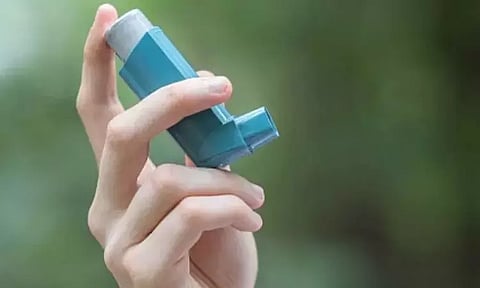

NEW DELHI: Inappropriate reliance on inhalers by patients with poorly controlled asthma has been calculated to significantly contribute to overall carbon footprint, according to a new UK research published in the British Medical Journal.
Examining health records of more than 236,000 people with asthma, researchers found that the overall carbon footprint attributed to asthma care added up to 750,540 tonnes of carbon dioxide equivalent (CO2e) of greenhouse gas emissions per year when scaled to the entire UK asthma population. The records were submitted to the clinical database 'Clinical Practice Research Datalink' between 2008 and 2019.
In nearly half of these patients (47 per cent), asthma was poorly controlled and contributed to excess greenhouse gas (GHG) emissions of 303,874 tonnes CO2e per year, equivalent to emissions from more than 124,000 homes in the UK, the researchers estimated.
They categorised poorly controlled asthma as involving three or more short-acting beta-agonists (SABAs) reliever inhalers in a year, along with episodes of severe worsening symptoms.
The team, including scientists from the research-based biopharmaceuticals company Astrazeneca, said that 90 per cent of these excess GHG emissions comprised of inappropriate use of SABAs that contain drugs to quickly open airways for stopping asthmatic symptoms such as wheezing.
The remainder came from healthcare resources used in treating severe worsening symptoms, which the team defined as requiring oral corticosteroids, an emergency department visit, or hospitalisation.
The excess emissions were eight times likelier to come from a person with poorly controlled asthma than from a well controlled asthma patient - prescribed fewer than three SABA in a year and no report of worsening symptoms, the researchers found.
Conversely, they also found that poorly controlled asthma care involving prescriptions and management generated three-fold higher GHG emissions, compared with well controlled asthma.
"Our study indicates that poorly controlled asthma contributes to a large proportion of asthma-care related greenhouse gas emissions with inappropriate SABA use emerging as the single largest contributor," the researchers wrote.
The study is the first to quantify asthma care-based GHG emissions according to prescribing practices in the UK, with the specific objective of estimating GHG emissions related to the management of well-controlled versus poorly controlled asthma, they said.
The authors concluded that improving asthma treatment practices by curtailing inappropriate SABA use and implementing evidence-based treatment recommendations could result in substantial carbon savings.